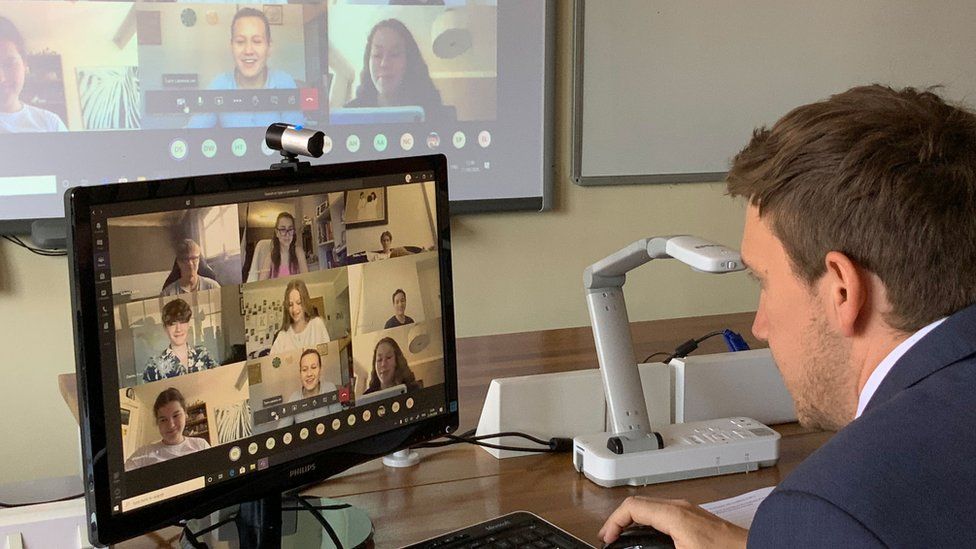Emergency powers adopted to require schools to teach online
- Published

Ministers are using powers under the Coronavirus Act to require schools to offer pupils who are not in school the same lessons as those in class.
Teaching unions reacted angrily to the move calling it a "grave error" which risks damaging the government's relationship with the profession.
It comes after official figures showed one in six secondaries in England were partially closed to some pupils.
The government said it was formalising pupils' rights to remote learning.
It comes as huge swathes of the north-east and north-west of England are under stricter lockdown measures.
Ministers have insisted that schools will only close as a last resort in the event of widespread virus spread.
Instead, in areas where cases are high, schools may switch to a rota system of two weeks on, two weeks off.
The guidance, published on the Department for Education website, said: "The Direction means schools have a duty to provide education to children at home, as they do when children are in the classroom."
'No disruption'
It added: "The Direction will help provide assurances to both pupils and parents that if pupils have to self-isolate at home their education will not be disrupted.
"In the event of a confirmed case, schools are following the necessary guidance, including requiring small groups of children to self-isolate.
"In these cases, continuing to provide education is an absolute necessity.
"The Direction helps ensure this and sets a clear expectation on the high-quality education they should receive."
But general secretary of the NAHT head teachers' union Paul Whiteman said there was no need to reach for legal powers as there was every indication that schools have taken their preparations for partial or full closure seriously.
Heads were "taking steps to ensure they meet and exceed government and parental expectations for remote education, should circumstances require it," he said.
'Emergency powers'
He added: "Right now, government action should be focused wholly on support, not sanction - the carrot, not the stick.
"Bitter experience tells us that mandating compliance to a minimum criteria is a poor way of driving quality and excellence in a system.
"There is absolutely no reason to believe that emergency powers are required to compel schools to act.
"By reaching for legal powers, the government risks sending an unequivocal message to the profession and parents that they do not trust school leaders to act in the interests of young people in this country."
Head teachers unions had advised DfE officials strongly against using such emergency powers, adding that they had been working flat out for months to support children's education.
National Education Union joint general secretary Mary Bousted said: "Staff in schools are desperate to do their best for pupils and the pandemic makes their roles all the more important.
"The legal requirement to provide remote education must be backed by government support for what is, by some distance, not business as usual."
She claimed a support package, announced alongside the guidance, promising 100,000 laptops, fell short by a long way.
"This government is once again trying to cut corners over Covid.
"Schools were crying out for the right support for online learning throughout lockdown, not least for disadvantaged young people who did not have the right IT or wi-fi equipment at home that would have ensured a continuity and parity of learning."
The government is also facing growing pressure to make a back-up plan in case GCSEs and A-levels cannot go ahead.